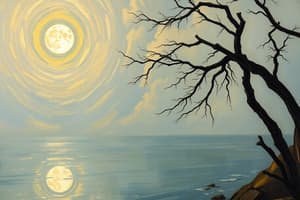Podcast
Questions and Answers
Where did Campbell teach in New York City?
Where did Campbell teach in New York City?
- New York University
- Sarah Lawrence College (correct)
- Harvard University
- Columbia University
What was the name of Campbell's first book?
What was the name of Campbell's first book?
- A Skeleton Key to Finnegans Wake (correct)
- Philosophies of India
- The Hero with a Thousand Faces
- Myths and Symbols in Indian Art and Civilization
Who did Campbell credit with influencing his comparative and symbolic approach to mythology?
Who did Campbell credit with influencing his comparative and symbolic approach to mythology?
- Heinrich Zimmer (correct)
- Carl Jung
- Henry Morton Robinson
- Bill Moyers
What was the title of the television series that made Campbell a household name?
What was the title of the television series that made Campbell a household name?
Where did Campbell move to upon his retirement from Sarah Lawrence College in 1972?
Where did Campbell move to upon his retirement from Sarah Lawrence College in 1972?
What influenced Joseph Campbell's interest in mythology during his childhood?
What influenced Joseph Campbell's interest in mythology during his childhood?
What is one of Campbell's primary conclusions regarding myths?
What is one of Campbell's primary conclusions regarding myths?
Which two figures did Campbell credit for influencing his understanding of myth interpretation?
Which two figures did Campbell credit for influencing his understanding of myth interpretation?
What was Campbell's academic focus after graduating from Columbia University?
What was Campbell's academic focus after graduating from Columbia University?
Why did Campbell leave the doctoral program at Columbia University?
Why did Campbell leave the doctoral program at Columbia University?
Flashcards are hidden until you start studying
Study Notes
Early Life and Influences
- Joseph Campbell was born on March 26, 1904, in New York, New York, U.S.
- He was fascinated by artifacts of Native Americans at the American Museum of Natural History.
- He saw parallels between Christian beliefs and Native American religious beliefs, leading him to conclude that the similarities could not be coincidental.
Education and Career
- Campbell graduated from Columbia University with a B.A. in English literature (1925) and an M.A. in medieval literature (1927).
- He studied Old French and Sanskrit at the University of Paris and the University of Munich on a two-year fellowship.
- He discovered the keys to interpreting myth nonhistorically and nonliterally in the work of Sigmund Freud and Carl Jung.
- He taught at the preparatory school he had attended as a boy (1932-33) and later at Sarah Lawrence College, where he became a professor of literature.
Works and Contributions
- Campbell co-authored A Skeleton Key to Finnegans Wake (1944) with Henry Morton Robinson.
- He edited four tomes based on Heinrich Zimmer's lecture notes: Myths and Symbols in Indian Art and Civilization (1946), The King and the Corpse (1948), Philosophies of India (1951), and The Art of Indian Asia (1955).
- He wrote The Hero with a Thousand Faces (1949), which remains his best-known work.
- He tied the meaning of myth to its plot and claimed to have deciphered the common plot of all hero myths.
Later Life and Legacy
- Campbell retired from Sarah Lawrence College in 1972 and moved to Honolulu with his wife, Jean Erdman.
- He became a popular figure on the lecture circuit in the 1970s and '80s.
- He was interviewed by Bill Moyers on public television, but died before the interview was first broadcast in 1988.
Studying That Suits You
Use AI to generate personalized quizzes and flashcards to suit your learning preferences.




